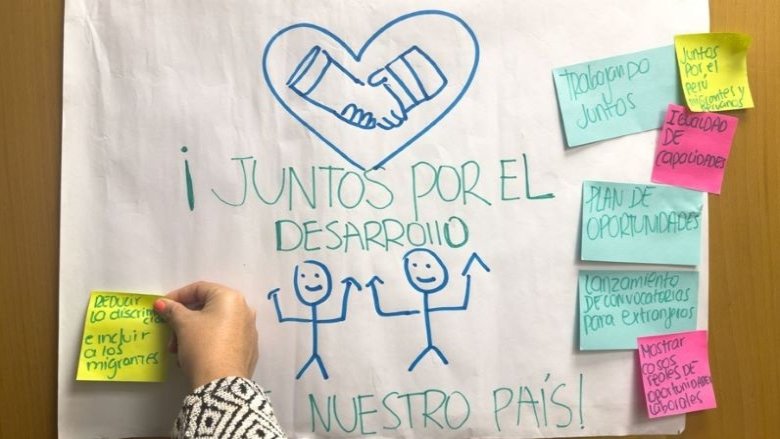Finding a job or starting a business are challenging endeavors. Now, imagine doing it in a foreign country, where procedures, customs, and support networks might be different from those in your country of origin, and where you might be treated differently for being a foreigner. Nearly 1.5 million Venezuelan migrants and refugees may have experienced these obstacles in Peru in recent years, as they are seeking financial opportunities to join the workforce or become an entrepreneur. They may also face hurdles in launching their ventures and realizing their dreams.
Numerous perception studies have pointed out that migrants and refugees receive differential treatment from both public and private service providers compared to the local population. To respond to this need, we initiated the groundbreaking project named “Training Workshop on Behavioral Drivers and Biases to Reduce Discrimination and Financial Exclusion of the Venezuelan Population in Peru”. Its main objective was to find ways to ease the financial inclusion of Venezuelan migrants and women, providing training and recommendations to create positive behavioral changes in decisions and systems.
The mission was clear: on the one hand, we wanted to reveal behaviorally-driven conscious and unconscious biases contributing to discrimination, exclusion, and prejudice against Venezuelan migrants in accessing financial services in a private organization. On the other, we wanted to contribute to the financial institution's internal capabilities and value proposition, supporting both the migrant population in Peru and enhancing the local business portfolio. By doing so, we bridge a knowledge gap concerning challenges for migrants in Peru in accessing opportunities within the private sector, where the results offer a blueprint for success that can be replicated in other countries and industries where behavioral change is a precondition to achieving impact in society and business.
From data collection to hands-on engagement
This project was more than just data collection. It also involved a custom-made three-day series of engaging workshops aimed at creating meaningful change. To get to the heart of the matter, the diagnostic phase involved gathering data from a diverse and representative sample of employees. This wasn't a traditional survey, it utilized cutting-edge behavioral tools and vignette experiments.
This innovative research approach allowed us to understand how decisions were influenced by customer profiles, considering factors such as nationality (e.g., Venezuelan vs. Peruvian) and gender. Using these insights, we were able to customize the workshops to make sure they addressed the biases and perceptions we identified among the employees of that particular company.
Measuring for Action: Key Insights
The results revealed a striking level of mistrust directed towards migrants, particularly if they are women. These groups faced challenges when accessing basic financial services like opening a savings account or securing a loan showing intersectional discrimination. Noticeable differences were found in the lower quality of treatment and service provided to Venezuelan customers compared to Peruvian ones. By doing so, the research allowed us to understand better and map out the existence of systemic barriers for Venezuelan migrants and women in opening savings accounts and obtaining loans.
Turning findings into action
Armed with these insights, three tailored training workshops were developed to raise awareness among staff and collectively overcome these barriers.
- The first workshop introduced the identified biases and explored pedagogical, participatory ways to transform these hurdles. We did this by mixing insights from the academic literature and the company’s diagnostic results, together with theater-based role-playing activities to reflect, rehearse, and reinforce potential behavioral change avenues that employees could implement in their daily work.
- The second workshop was a more specialized session, specially designed to empower key employees to become agents of change within the organization.
- The third session presented the results of the diagnostic and the workshops to the organization's senior executives, kickstarting discussions to further support the institution's leadership.
What lies ahead
This experience can be replicated not only in other countries and industries but also in challenging scenarios where behavioral change is a precondition to achieve impact. The interest and discussions generated by initiatives like these are a powerful catalyst for implementing sustainable behavioral change strategies that engage and benefit all levels of local financial institutions.
To achieve this, it’s important to:
- Engage stakeholders (including the different levels within those stakeholders) around the desired changes.
- Collect and analyze rigorous data on the behavioral drivers and barriers behind the challenges we seek to tackle.
- Implement evidence-based, participatory, and pedagogical interventions that give people at different levels concrete avenues for change.
In collaboration with the International Finance Corporation (IFC) in Peru, and with financial support from the Government of Canada, this project showcases the large impact that collaboration between the private sector, international cooperation, and related key stakeholders mixed with innovative approaches, and a commitment to positive change can have in creating a more inclusive and equitable financial landscape for all.
We are deeply thankful to the leadership and support of the Social Sustainability and Inclusion Unit working on Migration, Forced Displacement, and Inclusion: Paula Rossiasco, Lorena Levano, and Greta Granados de Orbegoso, the behavioral sciences consultants for the design of the activity and its technical execution: Enrique Fatas, Luis Artavia-Mora, and Paulius Yamin, and to our IFC colleagues for the cooperation and support: Frida Ruiz Fernandez, Roberto Rubio and Rexvi Rivera. The expertise and commitment of all these members were vital for the success of this project.

